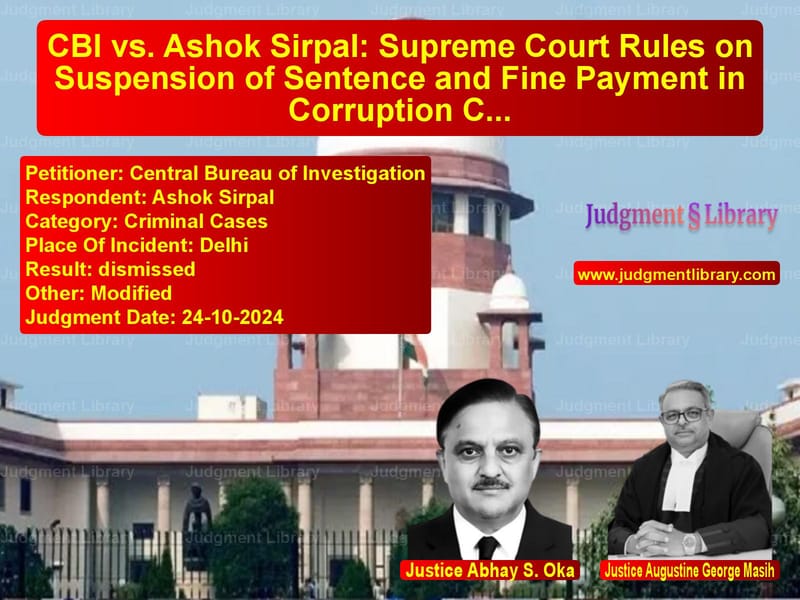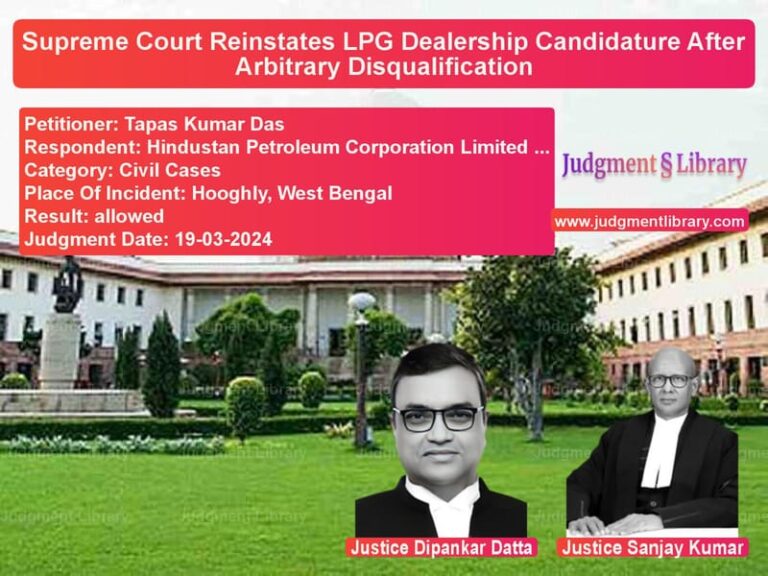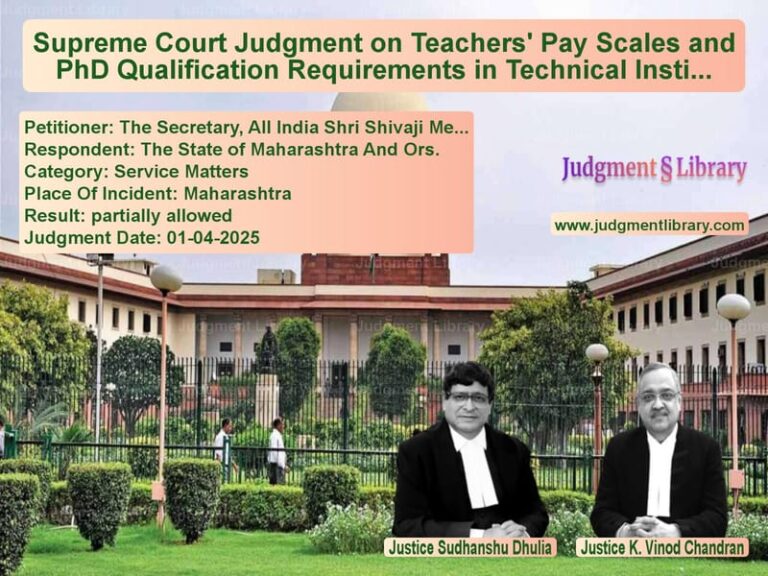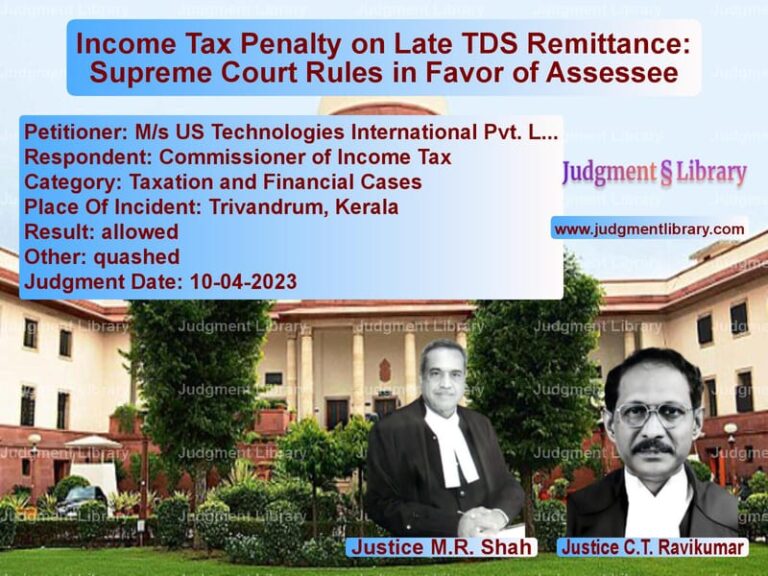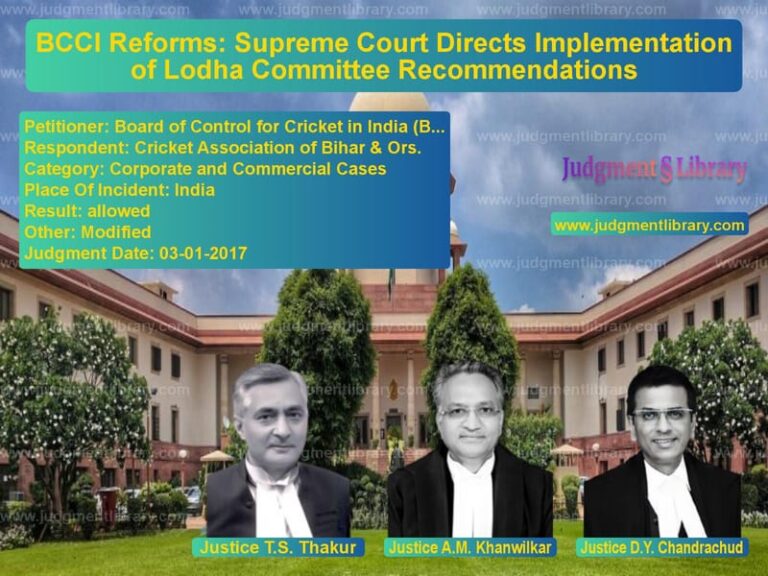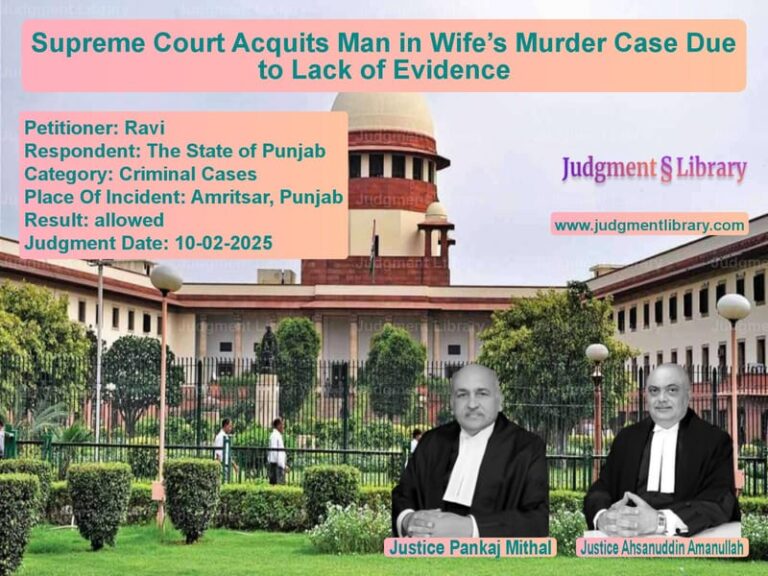CBI vs. Ashok Sirpal: Supreme Court Rules on Suspension of Sentence and Fine Payment in Corruption Case
The case of Central Bureau of Investigation (CBI) vs. Ashok Sirpal revolved around a significant legal question: whether the suspension of a convicted person’s sentence also included the suspension of the fine imposed. The Supreme Court addressed the issue while interpreting provisions under the Code of Criminal Procedure, 1973 (CrPC) and the Prevention of Corruption Act, 1988.
This appeal was filed by the CBI against the Delhi High Court’s order that had suspended the sentence of Ashok Sirpal, who had been convicted by a Special Judge under the Prevention of Corruption Act. The case involved serious allegations of embezzlement of Rs. 46 lakh and illegal financial activities.
Background of the Case
The respondent, Ashok Sirpal, was convicted by the Special Judge (CBI, PC Act), Karkardooma Courts, Delhi, on January 27, 2016. He was found guilty under the following provisions:
- Section 120B read with Sections 420 and 419 of the Indian Penal Code (IPC)
- Sections 13(1)(d) and 13(2) of the Prevention of Corruption Act, 1988
He was sentenced to seven years of rigorous imprisonment for each offense and fined Rs. 95 lakh. In default of payment, he was to undergo an additional 21 months of simple imprisonment. The trial court ordered that all sentences run concurrently.
Upon appeal, the Delhi High Court admitted his appeal and, on September 29, 2016, suspended his sentence upon furnishing a personal bond of Rs. 50,000 and a surety of an equal amount. The High Court also imposed a travel restriction on the respondent, requiring permission to leave the country.
CBI’s Arguments
The Additional Solicitor General (ASG), representing the CBI, presented the following arguments:
- The Special Judge had established that the respondent and co-accused were involved in embezzlement of Rs. 46 lakh.
- The High Court’s order only suspended the substantive sentence of seven years of imprisonment and did not explicitly suspend the fine of Rs. 95 lakh.
- The respondent had only paid Rs. 15 lakh of the total fine, leaving a significant amount unpaid.
- The respondent was liable to be taken into custody to serve the default sentence of 21 months for non-payment of the fine.
- As per the Supreme Court’s ruling in Satyendra Kumar Mehra v. State of Jharkhand (2018), the sentence of fine remains enforceable unless explicitly suspended.
Respondent’s Arguments
The senior counsel for the respondent countered with the following points:
- The High Court had suspended the entire sentence, including the fine imposed.
- The respondent had already deposited Rs. 15 lakh with the Supreme Court.
- The total sentence, including imprisonment and default imprisonment for non-payment of fine, amounted to eight years and nine months, and since the appeal was unlikely to be heard soon, the suspension was justified.
- As per Section 389 of the CrPC, the appellate court has the power to suspend both the sentence of imprisonment and fine.
Supreme Court’s Key Observations
The Supreme Court examined Section 389 of the CrPC, which grants appellate courts the authority to suspend execution of a sentence pending appeal. The Court also analyzed Sections 53 and 64 of the IPC, which define punishments, including fines and imprisonment.
The Court made the following crucial observations:
- A fine imposed in a sentence is a form of punishment and must be treated as part of the sentence.
- Under Section 64 IPC, if a fine is not paid, the offender can be sentenced to imprisonment in default of payment.
- In Satyendra Kumar Mehra v. State of Jharkhand, the Supreme Court had ruled that an appellate court can suspend both imprisonment and fine. However, if the order does not explicitly mention suspension of fine, the convict remains liable for default imprisonment.
- The High Court’s order did not clearly mention suspension of the fine, but since it acknowledged the entire sentence, it must be interpreted to include the fine as well.
Final Judgment
The Supreme Court held that:
- The High Court had effectively suspended the entire sentence, including the fine.
- The deposit of Rs. 15 lakh would be treated as a conditional requirement for suspending the fine.
- The remaining amount of Rs. 15 lakh, along with accrued interest, would be transferred to the Delhi High Court for investment in a fixed deposit.
- The amount would remain in deposit until the final disposal of the criminal appeal.
- Disbursement of the amount would be decided at the time of final judgment.
Conclusion
The Supreme Court’s decision in this case clarified the legal position on suspension of fines in criminal appeals. While courts can suspend both imprisonment and fines, the order must explicitly mention suspension of fines to avoid ambiguity. The judgment also emphasized the importance of financial penalties in corruption cases and ensured that the convict was held accountable for at least a partial payment.
Petitioner Name: Central Bureau of Investigation.Respondent Name: Ashok Sirpal.Judgment By: Justice Abhay S. Oka, Justice Augustine George Masih.Place Of Incident: Delhi.Judgment Date: 24-10-2024.
Don’t miss out on the full details! Download the complete judgment in PDF format below and gain valuable insights instantly!
Download Judgment: central-bureau-of-in-vs-ashok-sirpal-supreme-court-of-india-judgment-dated-24-10-2024.pdf
Directly Download Judgment: Directly download this Judgment
See all petitions in Fraud and Forgery
See all petitions in Money Laundering Cases
See all petitions in Bail and Anticipatory Bail
See all petitions in Extortion and Blackmail
See all petitions in Judgment by Abhay S. Oka
See all petitions in Judgment by Augustine George Masih
See all petitions in dismissed
See all petitions in Modified
See all petitions in supreme court of India judgments October 2024
See all petitions in 2024 judgments
See all posts in Criminal Cases Category
See all allowed petitions in Criminal Cases Category
See all Dismissed petitions in Criminal Cases Category
See all partially allowed petitions in Criminal Cases Category

